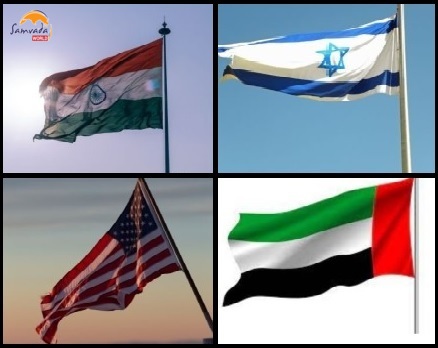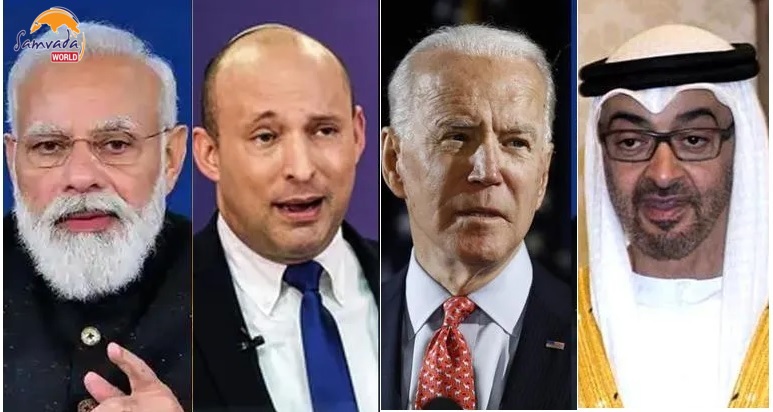
- The USA has always encouraged smaller grouping of countries with economic and strategic interests to pose a direct or indirect challenge to the emerging Chinese hegemony.
- The American establishment has serious concerns and perhaps apprehensions about the aggressive nature of Chinese expansionism.
- India, by joining this network would increase the efficiency and effectiveness of this Synergy process.
- As India already enjoys a close relationship with UAE and Israel, this alliance is bound to take off further than just limiting itself into an economic alliance.
Ever since the Abraham Accord came into being in 2020 and normalised the relations between UAE and Israel, a lot of geostrategic developments are taking place in the middle eastern region. New alliances, partnerships and multilateral networking have picked up quite swiftly. In this strong tailwind of changes, a new alliance including India, UAE, USA and Israel has been in the works. The Foreign Ministers of these countries met for the first time in October 2021 and pitched for the development of stable strategic partnerships with each other. This alliance is also being called the West Asian quad because of its perceived geopolitical implications on the emerging world order.
This alliance is said to be a result of minilateral diplomacy, wherein there is a lot of behind the scenes discussions going on to foster and develop the relationship constructively. The primary objectives of this alliance are going to be on economics and infrastructure followed by water and environment, security, healthcare, agriculture and other positive initiatives that would bring about tangible benefits to the partners. It appears from the outset that economic interests are the prime driving forces behind this new alliance.
Grounds for the minilateral
Former Israeli Diplomat Mark Sofer said to ORF (Observer Research Foundation) when asked about this alliance “Diplomats, analysts and think tanks are always on the lookout for ulterior motives, and perhaps on the new issues on the table which haven’t been said by the parties in any initiative; and the truth to be told in my 40 years of experience in foreign affairs that they are usually correct”. And the ulterior motive is certainly the growing international hegemony of the Chinese and the new cold war between the USA and China. In fact, in most minilaterals or smaller groupings that are emerging in the world, the elephant or rather dragon in the room happens to be China. But we must remember that India, USA and Israel have different obsessions driven by their own national interests and national security concerns. In this alliance, for instance, since India is in an alliance with Israel doesn’t mean India would be hostile to Iran, it would certainly continue its bilateral partnership on the strategic front. Or for that matter since Israel is in an alliance with India, it doesn’t mean Israel would like to ruffle its feathers with China.
In fact, in most minilaterals or smaller groupings that are emerging in the world, the elephant or rather dragon in the room happens to be China.
The USA has always encouraged smaller grouping of countries with economic and strategic interests to pose a direct or indirect challenge to the emerging Chinese hegemony. Perhaps this alliance brings together the two most dynamic economies of the Middle East with rising India and the resident external power USA. This would encourage India to reclaim its position in what is its civilizational or geographical sphere of influence i.e. the western Indian Ocean and the Gulf. We need to understand that from the US point of view the more India plays a bigger role in the Asian region, whether towards the east or to the west, it will facilitate the American grand strategy and the national security interests. The American establishment has serious concerns and perhaps apprehensions about the aggressive nature of Chinese expansionism. Even if the complementary capabilities and deterrent power lie largely with the USA, it is urging UAE and India to play the role of regional counterbalancers. US’s Synergy with Israel in defence Infrastructure, digital technology sphere, transportation and maritime capabilities is just exemplary.
What’s in it for India?

India, by joining this network would increase the efficiency and effectiveness of this Synergy process. Because India is also developing more defence and technological capabilities along with envisioning a world-class infrastructure. As India already enjoys a close relationship with UAE and Israel, with the USA being its strategic Ally this alliance is bound to take off further than just limiting itself into an economic alliance. Here, it becomes very significant to understand that UAE and Dubai in particular, is the key interlocutor in the group because it consists of a critical mass of business and finance networks which are very crucial in promoting trade linkages at a very swift pace. So UAE has the potential of being a double engine for both defence and economic powerhouse with the support of this prospective alliance.
We need to note that the USA is a key security partner and defence supplier to all other countries in this alliance. The US supplies 68% and 78% of defence equipment/components to UAE and Israel respectively. It is India’s second-largest defence partner. With the USA playing the role of a key security partner and India playing the role of a key economic partner, the geopolitical imperative that would emerge out of this alliance would be far different from its initial conception. Perhaps the reason why the USA encourages regional partners is that it can wither away to some extent, with its role of being a global policeman (a predominant hegemon).
With the USA playing the role of a key security partner and India playing the role of a key economic partner, the geopolitical imperative that would emerge out of this alliance would be far different from its initial conception.
Another reason why this alliance has scope for a strategic breakthrough is its mutual trust in partnership and collective progress. A Brookings Institute study conducted two years ago shows that UAE and Israel are the most trusted couriers by India in the Middle East with both political and economic bondings. The ORF conducted another survey almost a year ago where it was discovered that the US is the most trusted international ally amongst Indians. These are clear indications of mutual interests and converging geopolitical commonalities.
Conclusion
However, as of now, perceiving this new quad as a geo-economic grouping being an implicit alternative to the Chinese BRI ( Belt and Road Initiative) is completely misconstrued as its aims and purposes are entirely different. By engaging in false signalling, unforeseen frictions and complications could unfold in world politics. It’s very unlikely for the group to become a security alliance in the near future as there is no single perception of threat to national security which is common to the involved partners. Moreover, it becomes critical to mention that India is unlikely to share any of the security burdens that the US might intend to take up at a given point of time in future. India is mired up in its vicious cycle of two front security situations, in its borders with Pakistan and China, and lacks any international security ambition, to plunge into a military intervention with geostrategic consequences.
The minilaterals like this, provide the scope for political disagreements, with the flexibility to engage with each other often driven by mutual strategic and geo-political compulsions. As of now, there is no hyphenation associated with this new quad, in the form of a counterbalancing military alliance aiming at China. As the security dynamics and the nature of conflict escalates with great power rivalry between major global counterparts, certain paradigm shifts in alliances are bound to happen. This new quad is no exception to that.
(The author has a MA in political science and international relations. Views expressed are authors own)
Viswapramod is a PhD Scholar at the Department of International Studies and Political Science, Christ University, Bangalore. He has an MA in International Relations. Views expressed are the author’s own.
